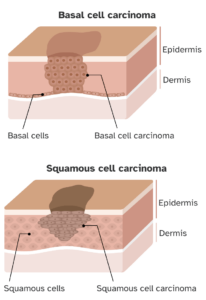Are Basal and Squamous Cell Skin Cancers Genetic?Explore Basal and Squamous Cell Carcinoma and what your DNA can tell you
What are basal and squamous cell skin cancers?
Basal cell carcinoma (BCC) and squamous cell carcinoma (SCC) are the two most common types of skin cancer. They begin in basal cells and squamous cells, which are found in the outer layer of the skin. The most common cause of basal and squamous cell skin cancers is too much exposure to ultraviolet (UV) light from the sun (including through clouds and glass windows). In addition, UV light exposure from tanning beds and sun lamps increases the chances of developing basal and squamous cell skin cancers.
BCC and SCC usually develop on areas of skin that get a lot of sun exposure. For BCC, the most common locations include the face, head, and neck. For SCC, the most common locations include the scalp, backs of the hands, ears, and lips. Both types of skin cancer can also develop on other parts of the body. For example, among people with darker skin, SCC commonly appears on the legs and other areas that typically get less sun exposure. Basal and squamous cell skin cancers can vary in appearance, but the first sign is typically a bump, growth, or sore that doesn’t heal.

How can basal and squamous cell skin cancers impact your health?
When BCC and SCC are detected at an early stage, they can usually be treated successfully. But untreated BCC and SCC can grow deep into the skin and damage nearby tissues, including blood vessels and nerves. Squamous cell carcinoma and, more rarely, basal cell carcinoma can also spread to other parts of the body, which can cause complications. In addition, people who have had either basal or squamous cell skin cancer have an increased chance of recurrence and developing other skin cancers as well.
This is why it’s so important to protect your skin, get familiar with your skin’s appearance, and perform regular skin self-checks. Talk to a healthcare professional like a dermatologist if you notice any unusual changes.

Are basal and squamous cell skin cancers genetic?
Genetics do play a role in basal and squamous cell skin cancers. This means some people will be more likely to develop them based on their genetics.
How does skin color play a role?
While people with lighter skin are more likely to develop basal and squamous cell skin cancers, people with any skin color can develop these and other skin cancers. And people with darker skin are more likely to be diagnosed with skin cancer at a later stage, when it can be harder to treat. This may be due to multiple factors, including that patients and healthcare providers may be less familiar with the typical appearance and location of skin cancer on skin of color. For example, people with darker skin are more likely to develop squamous cell skin cancers on locations that get less sun exposure, such as the legs. Learn more about skin cancer in people of color from the American Academy of Dermatology.
Did you know?
Basal and squamous cell skin cancers are the two most common types of skin cancer in the U.S. Every year, more than 3 million Americans are diagnosed with basal cell carcinoma, and more than 1 million Americans are diagnosed with squamous cell carcinoma. In addition to genetics, sun exposure, and family history, your age and certain physical characteristics can also impact your chances of developing these skin cancers. They become more common as people get older, although they can also affect younger people. And people with light skin, blue or green eyes, blonde or red hair, or freckles are also more likely to develop these cancers.
Explore more
Interested in learning how your genetics may be related to basal and squamous cell skin cancers? Find out more with the Skin Cancer (Basal and Squamous Cell Carcinomas) report (Powered by 23andMe Research), part of the 23andMe+ Premium membership. 23andMe+ Premium includes everything in our Health + Ancestry Service plus new premium reports and features throughout the year.

23andMe+ Premium
Please note:
- The Skin Cancer (Basal and Squamous Cell Carcinomas) report does not diagnose basal and squamous cell carcinomas and should not be used to make medical decisions.
- The report was developed by 23andMe scientists using data and insights gathered from thousands of customers who consent to participate in our research. Reports based on 23andMe research provide an estimate of your likelihood of developing a condition based on your genetics and other factors. This report does not account for lifestyle or family history.
- The report does not account for every possible genetic variant that could affect your likelihood of developing basal and squamous cell carcinomas.
- ‚Note that customers of certain ethnicities may not receive a genetic result. To learn more about this limitation, please see our Help Center article. These reports have not been reviewed by the FDA.
References:
American Academy of Dermatology Association. “Skin Cancer Types: Basal Cell Carcinoma Overview.” Retrieved November 17. 2021, from https://www.aad.org/public/diseases/skin-cancer/types/common/bcc.
American Academy of Dermatology Association. “Skin Cancer Types: Squamous Cell Carcinoma Overview.” Retrieved June 3, 2021, from https://www.aad.org/public/diseases/skin-cancer/types/common/scc.
Bradford PT. (2009). “Skin Cancer in Skin of Color.” Dermatol Nurs. 21(4): 170–178.
Centers for Disease Control and Prevention. “Basic Information About Skin Cancer.” Retrieved June 3, 2021, from https://www.cdc.gov/cancer/skin/basic_info/index.htm.
Gupta AK et al. (2016). “Skin Cancer Concerns in People of Color: Risk Factors and Prevention.” Asian Pac J Cancer Prev. 17(12): 5257–5264.
Mayo Clinic. “Basal cell carcinoma.” Retrieved June 3, 2021, from https://www.mayoclinic.org/diseases-conditions/basal-cell-carcinoma/symptoms-causes/syc-20354187.
Mayo Clinic. “Squamous cell carcinoma of the skin.” Retrieved June 3, 2021, from https://www.mayoclinic.org/diseases-conditions/squamous-cell-carcinoma/symptoms-causes/syc-20352480.
Skin Cancer Foundation. “Basal Cell Carcinoma Overview.” Retrieved November 17, 2021, from https://www.skincancer.org/skin-cancer-information/basal-cell-carcinoma/.
Skin Cancer Foundation. “Our New Approach to a Challenging Skin Cancer Statistic.” Retrieved June 3, 2021, from https://www.skincancer.org/blog/our-new-approach-to-a-challenging-skin-cancer-statistic/.
Skin Cancer Foundation. “Skin Cancer Facts & Statistics.” Retrieved November 4, 2021, from https://www.skincancer.org/skin-cancer-information/skin-cancer-facts/.
Skin Cancer Foundation. “Squamous Cell Carcinoma Overview.” Retrieved November 17, 2021, from https://www.skincancer.org/skin-cancer-information/squamous-cell-carcinoma/.